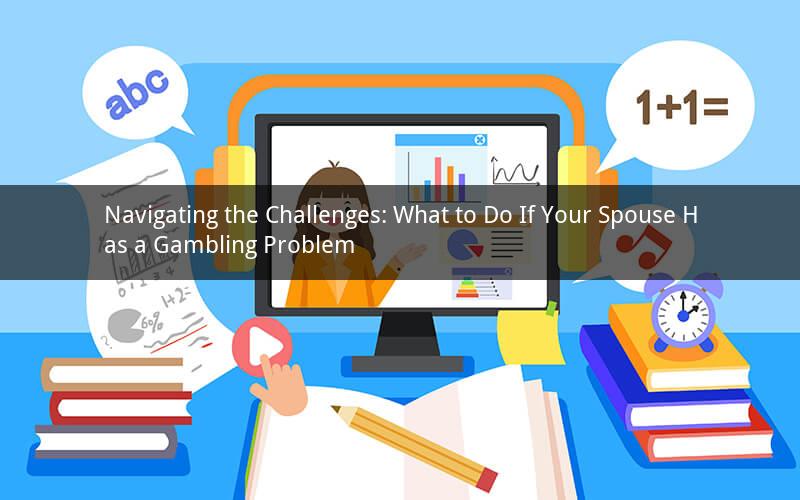
Introduction:
Gambling addiction is a complex issue that can have devastating consequences on both the individual and their family. If you suspect that your spouse has a gambling problem, it is crucial to understand the signs, consequences, and steps to take to support them on the path to recovery. This article delves into the various aspects of dealing with a spouse's gambling addiction, offering guidance and insights to help you navigate this challenging situation.
Understanding Gambling Addiction:
1. What is gambling addiction?
Gambling addiction, also known as problem gambling or compulsive gambling, is a behavioral addiction characterized by an uncontrollable urge to gamble despite negative consequences. It is a chronic condition that can affect individuals of all ages, backgrounds, and socioeconomic statuses.
2. Signs of gambling addiction:
Identifying the signs of gambling addiction is crucial in determining whether your spouse's behavior falls within the problematic range. Some common signs include:
- Secretive behavior: Hiding gambling activities, lying about spending habits, or avoiding discussions about finances.
- Financial problems: Increasing debt, missing payments, or financial strain due to excessive gambling.
- Emotional and psychological symptoms: Anxiety, depression, irritability, or mood swings.
- Social and occupational consequences: Neglecting responsibilities, missing work or school, or strained relationships with family and friends.
Supporting Your Spouse:
1. Educate yourself:
Understanding the nature of gambling addiction is essential in providing effective support. Educate yourself about the condition, its causes, and the impact it can have on your spouse's life. This knowledge will help you approach the situation with empathy and understanding.
2. Communicate openly:
Open and honest communication is key in addressing your spouse's gambling problem. Create a safe and non-judgmental environment where they feel comfortable sharing their struggles. Avoid confrontational language and focus on expressing your concerns without placing blame.
3. Encourage professional help:
Encourage your spouse to seek professional help from a therapist or counselor specializing in gambling addiction. Therapy can provide them with the necessary tools and strategies to overcome their addiction. Support them in attending counseling sessions and offer to accompany them if they feel comfortable.
4. Financial management:
Gambling addiction often leads to significant financial problems. Help your spouse manage their finances by creating a budget, monitoring spending, and seeking financial counseling if needed. Consider seeking legal advice to address any outstanding debts or legal issues related to gambling.
5. Support groups and resources:
Encourage your spouse to join support groups for individuals struggling with gambling addiction. These groups provide a sense of community, understanding, and practical advice. As a partner, consider attending support groups for loved ones affected by gambling addiction to gain support and guidance.
Addressing the Impact on Your Relationship:
1. Seek support for yourself:
Dealing with a spouse's gambling addiction can be emotionally and mentally taxing. Seek support from friends, family, or support groups specifically designed for individuals affected by gambling addiction. Sharing your experiences and concerns can provide you with valuable insights and coping strategies.
2. Set boundaries:
Establish clear boundaries to protect yourself from the negative consequences of your spouse's gambling addiction. This may include limiting access to gambling activities, setting financial boundaries, or establishing rules regarding communication and behavior.
3. Focus on positive aspects:
While it is important to address the gambling addiction, it is also crucial to acknowledge and celebrate the positive aspects of your relationship. Strengthening your connection and focusing on shared interests can help maintain a healthy relationship amidst the challenges.
4. Consider marriage counseling:
If the gambling addiction is significantly impacting your relationship, consider seeking marriage counseling. A therapist can help you navigate the challenges and work towards rebuilding trust and understanding.
5. Acceptance and patience:
Recovery from gambling addiction is a long and challenging process. Accept that progress may be slow and that setbacks may occur. Be patient with your spouse and yourself throughout this journey.
Conclusion:
Dealing with a spouse's gambling addiction is a complex and emotionally taxing experience. By understanding the nature of the addiction, providing support, addressing the impact on your relationship, and seeking professional help, you can navigate this challenging situation more effectively. Remember, recovery is possible, and with patience, understanding, and support, you can help your spouse overcome their gambling addiction and rebuild a healthier, happier life together.
Questions and Answers:
1. Q: How can I help my spouse overcome their gambling addiction?
A: You can help your spouse by educating yourself about the addiction, communicating openly, encouraging professional help, managing finances, seeking support groups, and addressing the impact on your relationship.
2. Q: Should I confront my spouse about their gambling addiction?
A: Yes, it is important to confront your spouse about their gambling addiction. However, approach the conversation with empathy, understanding, and a focus on expressing your concerns without placing blame.
3. Q: Can I force my spouse to seek help for their gambling addiction?
A: While you cannot force your spouse to seek help, you can encourage and support them in doing so. Offer to accompany them to counseling sessions, provide information about available resources, and express your willingness to support them throughout the recovery process.
4. Q: How can I protect myself from the negative consequences of my spouse's gambling addiction?
A: You can protect yourself by setting boundaries, seeking support for yourself, establishing clear financial rules, and focusing on positive aspects of your relationship. Consider seeking marriage counseling if the addiction is significantly impacting your relationship.
5. Q: Is it possible for a spouse to recover from a gambling addiction?
A: Yes, it is possible for a spouse to recover from a gambling addiction. Recovery is a long and challenging process, but with the right support, professional help, and a strong commitment to change, individuals can overcome their addiction and rebuild a healthier, happier life.